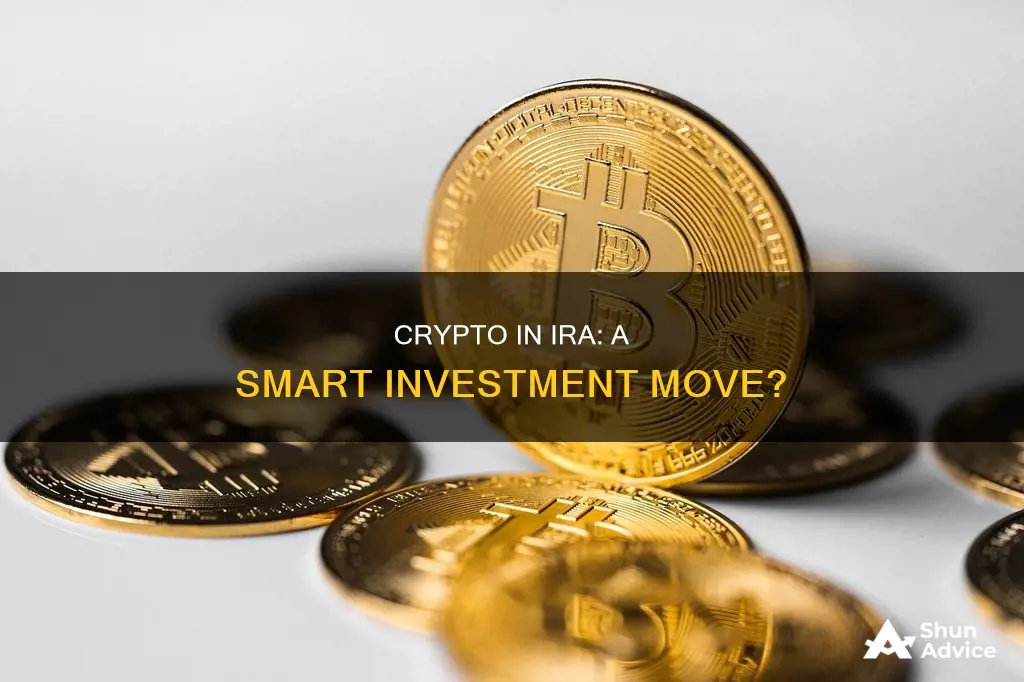
Investing in cryptocurrency for retirement is possible through a self-directed individual retirement account (IRA). This type of IRA allows investors to include alternative investments, such as real estate or commodities, that are not permitted in traditional IRAs. To invest in cryptocurrency through an IRA, individuals must first establish a self-directed IRA with a custodian of retirement plans. Then, they must create a limited liability company (LLC) that is owned by the IRA, which enables them to open a business checking account and link it to a digital wallet for buying and trading digital assets. While investing in cryptocurrency through an IRA offers certain advantages, such as diversification and potential tax benefits, it also carries significant risks and drawbacks, including volatility, high fees, and regulatory uncertainties.
| Characteristics | Values |
|---|---|
| How to invest in cryptocurrency | Through a self-directed IRA |
| Self-directed IRA | A powerful retirement plan that allows account owners to use alternative investments |
| Alternative investments | Real estate, private equity, gold, and cryptocurrency |
| Cryptocurrency IRA | An IRA with cryptocurrencies in its portfolio |
| Cryptocurrency as property | Cryptocurrencies are considered and taxed as property by the IRS |
| Cryptocurrency as tax-deferred | The sale of a cryptocurrency is not subject to tax and all gains are tax-deferred or tax-free in the case of a Roth IRA or Roth 401(k) |
| Cryptocurrency IRA fees | Initial setup fees, custody fees, trading fees, annual maintenance fees, blockchain processing fees |
| Cryptocurrency IRA risks | Volatility, risk of loss, potential for fraud, regulatory changes |
| Cryptocurrency IRA advantages | Diversification, expected growth in popularity and availability, potential for favourable tax treatment |
What You'll Learn

Crypto IRAs are subject to the same tax rules as standard IRAs
Crypto IRAs are a relatively new concept, with crypto not existing when Roth IRAs were invented in 1997. However, the IRS has been treating cryptocurrencies as property since 2014, and as such, they are taxed in the same way as stocks and bonds.
The IRS considers crypto to be a capital asset, and so it is subject to capital gains tax rules. This means that any gains or losses from the sale or exchange of cryptocurrency are taxed as short-term or long-term capital gains. If the cryptocurrency was held for less than a year, it is taxed at the same rate as income, whereas if it was held for longer than a year, it is taxed at the long-term capital gains rate.
Crypto IRAs are not taxed differently from standard IRAs. The tax implications depend on the type of IRA account held. Traditional IRAs are funded with pre-tax income, and so distributions at retirement age are taxed. Roth IRAs, on the other hand, are funded with after-tax dollars, and so distributions at retirement age are tax-free.
It is important to note that while crypto IRAs can provide tax benefits, they are also subject to the same risks as any other crypto investment, including extreme volatility.
Dogecoin Mars: A Good Investment or Just Hype?
You may want to see also

Crypto IRAs can be used to avoid capital gains taxes
While it is not possible to evade crypto taxes entirely, there are strategies to reduce your tax bill. One of these is to use a self-directed IRA to invest in crypto directly.
A self-directed IRA allows investors to hold alternative investments not permitted in a traditional IRA, such as real estate, precious metals, and cryptocurrencies. These IRAs can be set up as a Roth IRA, where you pay taxes on the funds in the account upfront, or a regular IRA, where you pay income taxes on withdrawals.
If you place your crypto in a Roth IRA, you can avoid paying capital gains taxes, as you already paid taxes on the funds in the account. On the other hand, if you put your crypto in a regular IRA, you will pay income taxes when you make a withdrawal.
It is important to note that self-directed IRAs are generally risky and expensive to maintain. They are also not widely available and may not be suitable for most investors. Additionally, the Internal Revenue Service has strict rules regarding prohibited investments in IRAs, and non-compliance can result in losing tax-deferred status.
Before investing in a crypto IRA, it is advisable to consult a certified financial advisor or accountant familiar with cryptocurrency to ensure you are making the best decision for your financial situation.
Atocha Coins: Worthy Investment or Risky Business?
You may want to see also

Crypto IRAs are only available through specialised custodians
Crypto IRAs are a relatively new concept and are not recognised by the IRS as a specific type of account. As such, they are only available through specialised custodians. These custodians are equipped to track, manage, and provide security for these digital assets.
Self-directed IRAs (SDIRAs) are the most common type of IRA that allows for crypto investments. These accounts are only available through specialised firms that deal with the type of asset in question. In the case of crypto IRAs, this is usually a firm specialising in digital assets.
Some examples of crypto IRA providers include BitIRA, Equity Trust, and Bitcoin IRA. These companies provide custodial services, storage options, and, in some cases, 24/7 trading access.
It is important to note that crypto IRAs come with certain risks, such as high fees, security risks, and extreme volatility.
A Beginner's Guide to Investing Money via Coinbase
You may want to see also

Self-directed IRAs allow alternative investments
Self-directed IRAs are available as either a traditional IRA or a Roth IRA. With a traditional IRA, you make tax-deductible contributions, whereas with a Roth IRA, you take tax-free distributions. Self-directed IRAs are best suited for knowledgeable investors who already understand alternative investments and want to diversify in a tax-advantaged account.
With a self-directed IRA, you can hold various alternative investments, including real estate, precious metals, commodities, private placements, limited partnerships, tax lien certificates, and other alternative investments. This type of IRA requires greater initiative and due diligence by the account owner.
Contributions to a self-directed IRA are limited to annual amounts. In 2024, the cap is $7,000. Account owners who are 50 or older can make additional "catch-up" contributions of up to $1,000. When you start making withdrawals, you'll pay regular income taxes based on your income level if you start withdrawing before you're 59 and a half years old. If you make any withdrawals before reaching this age, you'll owe a 10% penalty and pay income tax on the withdrawal.
It's important to note that self-directed IRAs are not for everyone. While they offer investors more control and flexibility over their investment choices, they require a high level of investment knowledge beyond the capacity of most investors. Additionally, setting up, managing, and investing in self-directed IRAs can be complicated. Therefore, it's crucial to work with a self-directed IRA company that can guide investors through the process.
When considering a self-directed IRA, it's essential to consult with a financial advisor or tax professional to navigate the decision-making process.
Launching a Crypto Investment Firm: Getting Started Guide
You may want to see also

Crypto IRAs are high-risk due to the volatile nature of cryptocurrencies
Crypto IRAs are high-risk investments due to the volatile nature of cryptocurrencies. Cryptocurrencies are subject to extreme price volatility, making them unsuitable for those seeking stable and liquid assets for their retirement portfolios. The leading cryptocurrency, Bitcoin, for example, has experienced significant price fluctuations, ranging from virtually no value to approximately $75,000 since its inception.
The volatile nature of cryptocurrencies introduces the risk of substantial losses. For instance, an investment of $1,000 in a cryptocurrency could lose more than 75% of its value over a few months and may never recover, resulting in a loss of $750. Larger investments would amplify these losses.
The high volatility of cryptocurrencies also impacts the ability to liquidate holdings in Crypto IRAs. While cryptocurrencies trade 24/7, Crypto IRA holdings can only be liquidated during standard market hours on business days. This discrepancy can create challenges during periods of extreme volatility, potentially resulting in missed opportunities or increased losses.
Additionally, cryptocurrencies are not backed by businesses or tangible assets. They rely solely on the belief that they possess value. If public and investor sentiment shifts on a large scale, cryptocurrencies could collapse, leading to significant financial losses.
The volatile nature of cryptocurrencies, coupled with their speculative nature, makes Crypto IRAs a high-risk investment option. Investors considering Crypto IRAs should carefully evaluate their risk tolerance and the potential impact on their retirement needs.
Cryptocurrency Investment: Is It Worth Your Money?
You may want to see also







